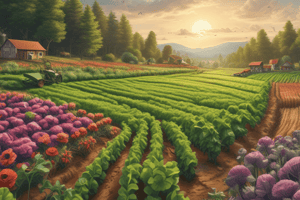Podcast
Questions and Answers
What are some benefits of sustainable farming?
What are some benefits of sustainable farming?
- Healthier food due to reduced use of synthetic fertilizers, pesticides, and other chemicals. 2. Reduced environmental impact by helping to reduce greenhouse gas emissions, preserve biodiversity, and maintain soil health.
What is the goal of sustainable farming?
What is the goal of sustainable farming?
To maintain the health of soil, water, and air while providing food and resources for the current generation without compromising the ability of future generations to meet their own needs.
Why is there a growing need for sustainable and efficient food production?
Why is there a growing need for sustainable and efficient food production?
Due to the increasing global population and climate change.
What is the key consideration in sustainable farming practices?
What is the key consideration in sustainable farming practices?
Signup and view all the answers
How does sustainable farming contribute to reducing environmental impact?
How does sustainable farming contribute to reducing environmental impact?
Signup and view all the answers
What are the economic benefits of sustainable farming?
What are the economic benefits of sustainable farming?
Signup and view all the answers
What is agroforestry and how does it benefit sustainable farming?
What is agroforestry and how does it benefit sustainable farming?
Signup and view all the answers
What is the focus of permaculture in sustainable farming?
What is the focus of permaculture in sustainable farming?
Signup and view all the answers
What are some of the challenges to sustainable farming?
What are some of the challenges to sustainable farming?
Signup and view all the answers
How are researchers and policymakers addressing the challenges of sustainable farming?
How are researchers and policymakers addressing the challenges of sustainable farming?
Signup and view all the answers
Study Notes
Improving Food Resources through Sustainable Farming
Introduction
Food production is a critical aspect of our lives, providing the energy and nutrients we need to survive. However, with the increasing global population and climate change, there is a growing need to find more sustainable and efficient ways to produce food. This has led to the development of various strategies and techniques to improve food resources, with a particular focus on sustainable farming.
Sustainable Farming
Sustainable farming is an agricultural practice that aims to maintain the health of soil, water, and air while also providing food and other resources for the current generation without compromising the ability of future generations to meet their own needs. This approach considers the long-term impacts of farming practices on the environment and communities, ensuring that the resources needed for food production are used in a responsible and sustainable manner.
Benefits of Sustainable Farming
Sustainable farming offers several benefits, including:
- Healthier food: Sustainable farming practices reduce the use of synthetic fertilizers, pesticides, and other chemicals, resulting in healthier and more nutritious food.
- Reduced environmental impact: Sustainable farming practices help to reduce greenhouse gas emissions, preserve biodiversity, and maintain soil health.
- Economic benefits: Sustainable farming can provide long-term economic benefits, as it helps to maintain the health of the land and ensures that it remains productive for future generations.
- Improved animal welfare: Sustainable farming practices often involve treating animals with respect and providing them with a high standard of living, reducing animal stress and improving overall animal welfare.
Techniques in Sustainable Farming
Several techniques are used in sustainable farming to improve food resources, including:
- Agroforestry: This involves incorporating trees into farming systems, which helps to increase biodiversity, reduce soil erosion, and improve soil health.
- Organic farming: This practice avoids the use of synthetic fertilizers, pesticides, and genetically modified organisms, relying instead on natural methods of pest control and fertility.
- Permaculture: This is a design approach that mimics natural ecosystems, focusing on creating diverse, self-sustaining, and low-maintenance systems.
- Regenerative farming: This approach aims to improve or restore the health of the land, often through practices such as minimal tillage, crop rotation, and the use of cover crops.
Challenges and Future Directions
Despite the benefits of sustainable farming, there are still several challenges to overcome, including:
- Scalability: Some sustainable farming practices can be difficult to implement on a large scale, which can limit their impact.
- Resource availability: Access to resources such as water, land, and labor can be a barrier to the adoption of sustainable farming practices.
- Economic incentives: Many farmers are reluctant to adopt sustainable practices due to the high upfront costs and potential for lower yields in the short term.
To address these challenges, researchers and policymakers are exploring ways to support the adoption of sustainable farming practices, such as providing subsidies, incentives, and education to farmers. Additionally, technological advancements, such as precision agriculture and vertical farming, are being explored as potential solutions to improve food production efficiency and sustainability.
Conclusion
Sustainable farming is a crucial step towards improving food resources while minimizing the environmental impact of food production. By adopting sustainable farming practices and techniques, we can ensure that we have access to healthy, nutritious food for generations to come. However, there are still challenges to overcome, and continued research and support are needed to ensure the widespread adoption of sustainable farming practices.
Studying That Suits You
Use AI to generate personalized quizzes and flashcards to suit your learning preferences.
Description
Test your knowledge about sustainable farming and its role in improving food resources. This quiz covers the principles of sustainable farming, its benefits, techniques used, challenges, and future directions.




